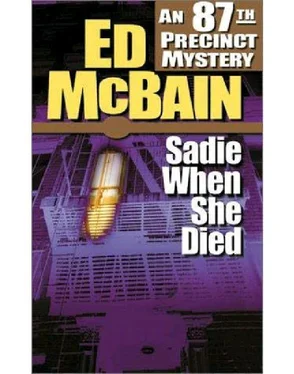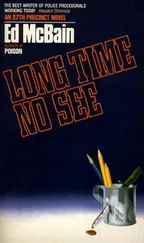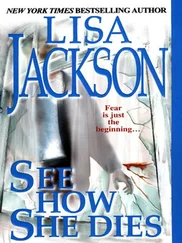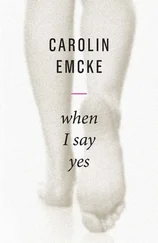Ed McBain - Sadie When She Died
Здесь есть возможность читать онлайн «Ed McBain - Sadie When She Died» весь текст электронной книги совершенно бесплатно (целиком полную версию без сокращений). В некоторых случаях можно слушать аудио, скачать через торрент в формате fb2 и присутствует краткое содержание. Жанр: Полицейский детектив, на английском языке. Описание произведения, (предисловие) а так же отзывы посетителей доступны на портале библиотеки ЛибКат.
- Название:Sadie When She Died
- Автор:
- Жанр:
- Год:неизвестен
- ISBN:нет данных
- Рейтинг книги:4 / 5. Голосов: 1
-
Избранное:Добавить в избранное
- Отзывы:
-
Ваша оценка:
- 80
- 1
- 2
- 3
- 4
- 5
Sadie When She Died: краткое содержание, описание и аннотация
Предлагаем к чтению аннотацию, описание, краткое содержание или предисловие (зависит от того, что написал сам автор книги «Sadie When She Died»). Если вы не нашли необходимую информацию о книге — напишите в комментариях, мы постараемся отыскать её.
Sadie When She Died — читать онлайн бесплатно полную книгу (весь текст) целиком
Ниже представлен текст книги, разбитый по страницам. Система сохранения места последней прочитанной страницы, позволяет с удобством читать онлайн бесплатно книгу «Sadie When She Died», без необходимости каждый раз заново искать на чём Вы остановились. Поставьте закладку, и сможете в любой момент перейти на страницу, на которой закончили чтение.
Интервал:
Закладка:
They did not talk about him again that afternoon. They walked through streets aglow with lighted Christmas trees, passing shop windows hung with tinsel and wreaths. Streetcorner Santa Clauses jingled their bells and solicited donations; Salvation Army musicians blew their tubas and trombones, shook their tambourines, and likewise asked for funds; shoppers hurried from store to store clutching giftwrapped packages while overhead the clouds grew thicker and more menacing.
Nora told him that she usually kept regular working hours in the studio she had set up in one room of her large, rent-controlled apartment. (“Except once a week, when I go up to Riverhead to visit my mother, which is where I was all day yesterday while you were trying to reach me”), and that she did many different kinds of freelance design, from book jackets to theatrical posters, from industrial brochures to line drawings for cookbooks, color illustrations for children’s books, and what-have-you. (“I’m usually kept very busy. It isn’t just the art work, you know, it’s running around to see editors and producers and authors and all sorts of people. I’ll be damned if I’ll give twenty-five percent of my income to an art agent. That’s what some of them are getting these days, don’t you think there should be a law?”) She had studied art at Cooper Union in New York City, and then had gone on for more training at the Rhode Island School of Design, and then had come here a year ago to work for an advertising firm named Thadlow, Brunner, Growling and Crowe (“His name really was Growling, Anthony Growling”) where she had lasted for little more than six months, doing illustrations of cans and cigarette packages and other such rewarding subjects before she’d decided to quit and begin freelancing. (“So that’s the story of my life.”)
It was almost three o’clock.
Kling suspected he was already halfway in love with her, but it was time to get back to the squadroom. He took her uptown in a taxi, and just before she got out in front of her building on Silvermine Oval, on the off-chance that her earlier protestations of undying love were in the nature of a ploy, he said, “I enjoyed this, Nora. Can I see you again sometime?”
She looked at him with an oddly puzzled expression, as though she had tried her best to make it abundantly clear that she was otherwise involved and had, through some dire fault of her own, failed to communicate the idea to him. She smiled briefly and sadly, shook her head, and said, “No, I don’t think so.”
Then she got out of the taxi and was gone.
Among Sarah Fletcher’s personal effects that were considered of interest to the police before they arrested Ralph Corwin was an address book found in the dead woman’s handbag on the bedroom dresser. In the Thursday afternoon stillness of the squadroom, Carella examined the book while Meyer and Kling discussed the potency of the copper bracelet Kling wore on his wrist. The squadroom was unusually quiet; a person could actually hear himself think. The typewriters were silent, the telephones were not ringing, there were no prisoners in the detention cage yelling their heads off about police brutality or human rights, and all the windows were tightly closed, shutting out even the noises of the street below. In deference to the calm (and also because Carella seemed so hard at work with Sarah Fletcher’s address book), Meyer and Kling spoke in what amounted to whispers.
“I can only tell you,” Meyer said, “that the bracelet is supposed to work miracles. Now what else can I tell you?”
“You can tell me how come it hasn’t worked any miracles on me so far?”
“When did you put it on?” Meyer said.
“I marked it on my calendar,” Kling said. They were sitting in the corner of the squadroom closest to the detention cage, Kling in a wooden chair behind his desk, Meyer perched on one end of the desk. The desk was against the wall, and the wall was covered with departmental flyers, memos on new rules and regulations, next year’s Detectives’ Duty Chart (listing Night Duty, Day Duty, and Open Days for each of the squad’s six detective teams), a cartoon clipped from the police magazine every red-blooded cop subscribed to, several telephone numbers of complainants Kling hoped to get back to before his tour ended, a photograph of Cindy Forrest (which he’d meant to take down), and several less-flattering mug shots of wanted criminals. Kling’s calendar was buried under the morass on the wall; he had to take down an announcement for the P.B.A.’s annual New Year’s Eve party to get at it. “Here,” he said. “You gave me the bracelet on December first.”
“And today’s what?” Meyer asked.
“Today’s the sixteenth.”
“How do you know I gave it to you on the first?”
“That’s what the MB stands for. Meyer’s bracelet.”
“All right, so that’s exactly two weeks. So what do you expect? I told you it’d begin working in two weeks.”
“You said ten days.”
“I said two weeks.”
“Anyway, it’s more than two weeks.”
“Listen, Bert, the bracelet works miracles, it can cure anything from arthritis to . . .”
“Then why isn’t it working on me?”
“What do you expect?” Meyer asked. “Miracles?”
There was nothing terribly fascinating about the alphabetical listings in Sarah Fletcher’s address book. She had possessed a good handwriting, and the names, addresses, and telephone numbers were all clearly written and easily read. Even when she’d crossed out a telephone number to write in a new listing, the deletion was made with a single sure stroke of her pen, the new number written directly beneath it. Carella leafed through the pages, finding that most of the listings were for obviously married couples, (Chuck and Nancy Benton, Harold and Marie Spander, George and Ina Grossman, and on and on), some were for girlfriends, some for local merchants and service people, one for Sarah’s hairdresser, another for her dentist, several for doctors, and a few for restaurants in town and across the river. A thoroughly uninspiring address book—until Carella came to a page at the end of the book, with the printed word MEMORANDA at its top.
“All I know,” Kling said, “is that my shoulder still hurts. I’m lucky I haven’t been in any fierce pistol duels lately, because I’m sure I wouldn’t be able to draw my gun.”
“When’s the last time you were in a fierce pistol duel?” Meyer asked.
“I’m in fierce pistol duels all the time,” Kling said, and grinned.
Under the single word MEMORANDA there were five names, addresses, and telephone numbers written in Sarah’s meticulous hand. All of the names were men’s names. They had obviously been entered in the book at different times because some were written in pencil and others in ink. The parenthetical initials following each entry were all noted in felt marking pens of various colors:
If there was one thing Carella loved, it was a code. He loved a code almost as much as he loved German measles.
Sighing, he opened the top drawer of his desk and pulled out the Isola directory. He was verifying the address for the first name on Sarah Fletcher’s MEMORANDA list when Kling said, “There are some guys who won’t let a case go, even after it’s been solved.”
“Who did you have in mind?” Meyer asked.
“Certain very conscientious guys,” Kling said.
Carella pretended neither of them was there. The telephone book address for Andrew Hart matched the one in Sarah’s handwriting. He flipped to the back of the directory.
“I knew a very conscientious cop one time,” Meyer said, and winked.
“Tell me about him,” Kling said, and winked back.
“He was walking a beat out in Bethtown, oh, this must have been three or four winters ago,” Meyer said. “It was a bitter cold day, not unlike today, but he was a very conscientious man, this cop, and he walked his beat faithfully and well, without once taking a coffee break, or even stopping in any of the local bars for a nip.”
Читать дальшеИнтервал:
Закладка:
Похожие книги на «Sadie When She Died»
Представляем Вашему вниманию похожие книги на «Sadie When She Died» списком для выбора. Мы отобрали схожую по названию и смыслу литературу в надежде предоставить читателям больше вариантов отыскать новые, интересные, ещё непрочитанные произведения.
Обсуждение, отзывы о книге «Sadie When She Died» и просто собственные мнения читателей. Оставьте ваши комментарии, напишите, что Вы думаете о произведении, его смысле или главных героях. Укажите что конкретно понравилось, а что нет, и почему Вы так считаете.












